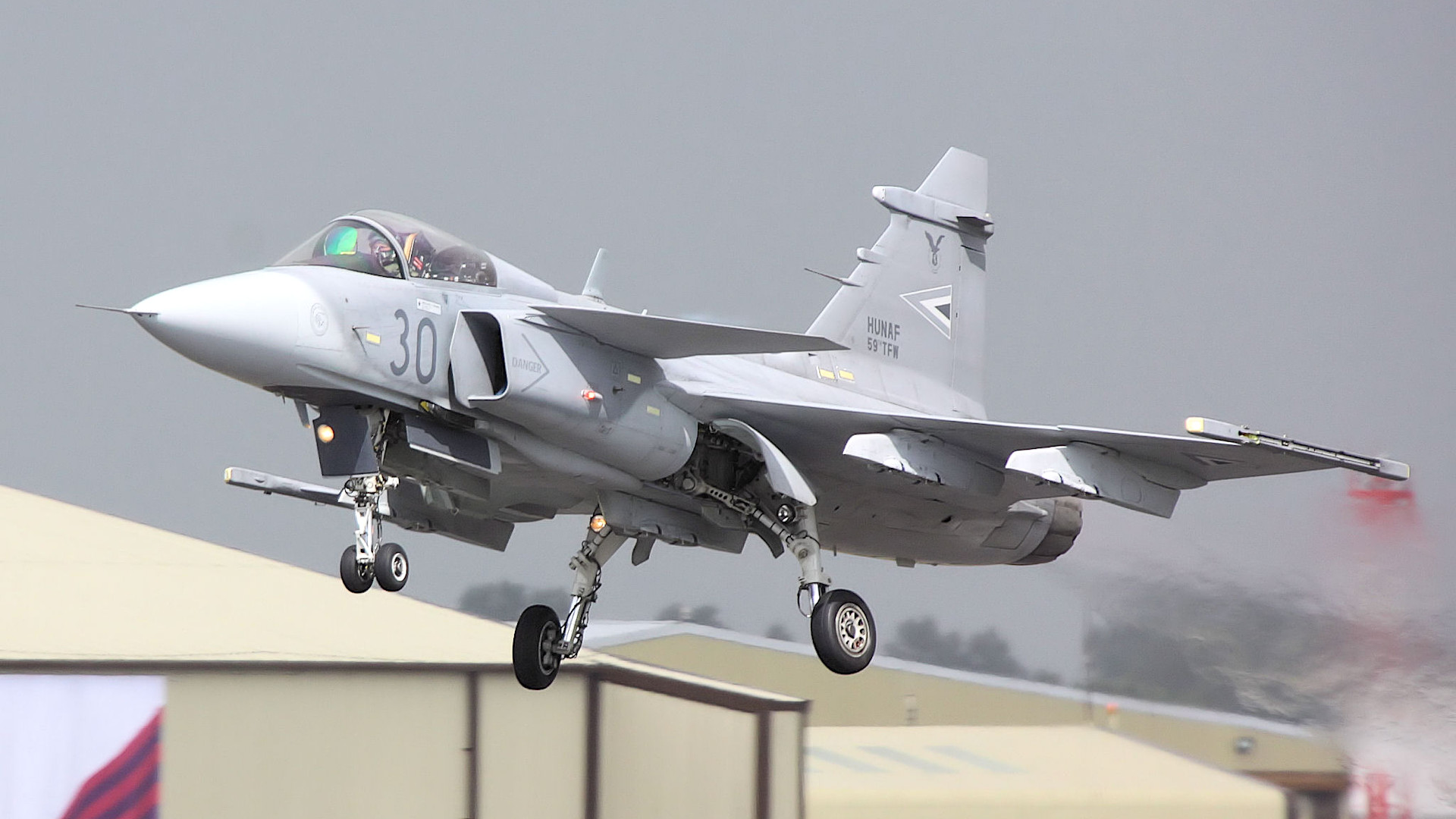The Hungarian Air Force is set to get four more Swedish-made Gripen C fighters under a deal signed earlier today. This comes ahead of the country’s expected vote to approve Sweden joining NATO on Monday.
Hungarian and Swedish authorities publicly signed the Gripen contract in Budapest. This was followed by a shared press conference by Hungarian Prime Minister Viktor Orban and his Swedish counterpart Ulf Kristersson. The Gripen’s manufacturer Saab also put out a press release confirming the sale of the jets. The release also announced a separate memorandum of understanding with the Hungarian Ministry of Defense “regarding [the] development of high-tech industrial areas and fighter aircraft capabilities” that is set to include “the establishment of a Center of Excellence for VR technologies in Hungary.”
In 2001, Hungarian authorities agreed to purchase 14 Gripens, 12 single-seat Gripen Cs and a pair of two-seat Gripen Ds. Today, Gripen is the only tactical combat jet in Hungary’s inventory and is central to the country’s air defense posture.

Hungary’s new Gripen deal, which is technically a modification of the original contract, will increase the total size of its fleet to 18 aircraft. It’s unclear where the four additional Gripen Cs for the Hungarian Air Force will come from and when they might be delivered. There is a possibility that the source could be the Swedish Air Force’s stocks. Sweden’s air arm is set to replace its Gripen C/Ds with newer E/F variants in the coming years.

“We not only keep our air defense capability but will increase it,” Hungary’s Orban said at the press conference following the signing of the deal.
“I strongly welcome this deepened cooperation on advanced fighting capabilities,” Sweden’s Kristersson, who also called the Gripen “a pride of Sweden,” said in his own remarks.
“With the Gripen fighter, Hungary has one of Europe’s most capable air forces. We look forward to continuing our close collaboration with the Hungarian Government and defense industry,” Saab’s President and CEO Micael Johansson said in a statement in the company’s press release.
Neither Orban nor Kristersson expressly linked the jets to Sweden’s ascension to NATO, but there are clear indications they are related. There does not appear to have been any prior indication that Hungary was actively in the market for new combat jets of any kind.

“I’m not just satisfied with the outcome,” Orban said today at the press conference with Kristersson. “I have enjoyed rebuilding confidence between the two countries.”
NATO requires that all of its existing members approve any new countries joining the alliance and Hungary is now the only one to have not done so. The Hungarian Parliament, which is dominated by Orban’s Fidesz party, is expected to ratify Sweden’s NATO membership on Monday.
Turkey had been the other holdout to Sweden’s NATO membership, but finally approved it last month. In a similar turn of events, the U.S. government subsequently approved a long-blocked proposed sale of F-16 Viper fighters for the Turkish Air Force.

Orban’s government has been under significant pressure from the United States and other members of NATO to approve Sweden’s membership for some time now. Orban has also been facing pressure and political isolation from the European Union (EU) over this matter and his government’s domestic policies. This includes criticism of a new law that gives authorities broad latitude to investigate and prosecute individuals on charges that ostensibly undermine Hungary’s sovereignty.
“To be a member of NATO together with another country means we are ready to die for each other,” Orban said at today’s press conference in defense of his slow-rolling of Sweden’s membership. “A deal on defense and military capacities helps to reconstruct the trust between the two countries.”
“We are pro-peace, and the Swedes are pro-war in the Russian-Ukrainian conflict,” the Hungarian Prime Minister, who has opposed military aid to Ukraine and has called for Kyiv to negotiate with Moscow, and who maintains ties with Russian President Vladimir Putin, added. Orban’s government also recently dropped its objections to a new EU aid package for the Ukrainian armed forces.
“We do not agree on everything, but we do agree that we should work more actively together when we have common ground,” Sweden’s Kristersson said.
Beyond the matter of Sweden’s NATO membership, this is a relatively small, but still important sale of Gripens for Saab. The current Gripen user base is small and Saab has been unsuccessful in many attempts over the years to secure additional export deals. In addition to Hungary, Brazil, South Africa, and Thailand have purchased Gripen variants, while the Czech Republic operates a fleet under a lease agreement.
“Saab currently has a contract with FMV [the Swedish Defence Materiel Administration] regarding support for Hungary’s Gripen aircraft, and Saab is ready to provide additional upgrades and support for the Hungarian fighters beyond 2035,” the company’s press release says today.
A statement last week from Philippine authorities suggested that there could be renewed interest in that country in acquiring Gripens. Saab is also pitching a sale of new Gripen E/Fs to Thailand.

There has also been talk in the past year or so about a potential sale or even a donation of Gripens to Ukraine, but there has been no formal movement on any such deal. At the same time, the Ukrainian Air Force is now set to receive a fleet of U.S.-made F-16s supplied by a multinational coalition.
Whatever else might be in store for Gripen, the matter of Sweden’s NATO membership looks to have helped solidify Hungary’s position as an operator of these jets for the foreseeable future.
Contact the author: joe@twz.com
